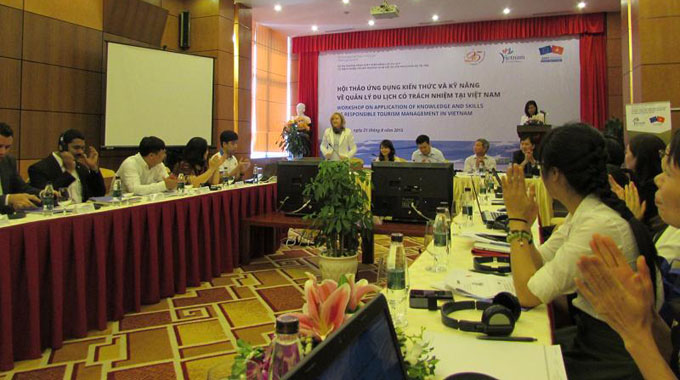(TITC) - On 21 August 2015, in Ha Long City, Quang Ninh Province, the project of "Environmentally and Socially Responsible Tourism Capacity Development Programme " funded by the European Union (referred EU project) under the Viet Nam National Administration of Tourism (VNAT) - Ministry of Culture, Sports and Tourism (MoCST), held a workshop on "Application of knowledge and skills of responsible tourism management in Viet Nam".

The workshop included representatives from the European Union Delegation in Viet Nam and VNAT; former leaders of VNAT; Taylor’s University (Malaysia), the Programme Implementation Unit of EU project; and all trainees participated in courses on responsible tourism management of the project.
The workshop aims to meet the requirements of the sustainable use of project training results, and helps the trainees apply knowledge into effective practice of Viet Nam tourism management.
In 4 years (from 2012 to 2015), in order to build capacity for staffs of VNAT, the vocational tourism schools (under MoCST), and departments of Culture, Sports and Tourism/ Departments of Tourism in the provinces/cities, EU project held training courses on Responsible Tourism Management. 66 trainees have completed courses for tourism management training, especially in sustainable tourism and responsible tourism at three well-known universities in the world including Breda University (Netherlands), Leeds Beckett University (UK) and Taylor’s University (Malaysia).
The workshop is considered as an important step in creating a forum for trainees to reunion, share knowledge and exchange ideas they have learned and experienced.
At the workshop, the trainees presented a brief introduction about training programe on Responsible Tourism Management at their universities; speeches about ethical tourism business management, responsible tourism marketing, natural resources and environmental management in tourism.
In addition, the trainees participated in discussion groups on solutions to enhance ethical business management and service quality management, product development, event management and responsible tourism marketing in Viet Nam. The trainees presented the advantages and disadvantages in implementing, and giving recommendations and proposals of solutions for applying effectively in specific situations.
Delegates at the workshop hope that with the knowledge and skills equipped through the training courses, the trainees will apply practice of responsible tourism for development strategy, planning, tourism promotion, and poverty reduction. Furthermore, the dissemination and transfer of knowledge of responsible tourism management in Viet Nam will be strengthened and improved. In particular, the coordination and connection between departments and localities will be improved through the trainees.
Delegates also hope and believe that in the next time, more same events will be organized to disseminate and transmit the knowledge trainees have gained among them as well as to the tourism management authorities at all levels who will contribute to ensuring strengthen and improvement of responsible tourism in Viet Nam.
Phuong Anh